Indian Coffee Bean Import to Europe
WHY INDIAN COFFEE BEANS?
We have a passion for Indian specialty coffee. It derives from several visits to small Indian coffee estates, meeting the famers and getting to know them and their values in coffee farming.
On the Coffee Estates nature is treated beautifully. The Estates are diverse in flora and fauna. There are plenty of shadow trees and useful plants. There is no usage of toxic pesticides or fertilizers on ecologically and bio-dynamically farmed estates (Balmaadi & Yellikodige Estates). On Hirekolale Estate, the usage of pesticides and fertilizers is minimal with an aim to grow more ecologic.
In addition to the farming methods, it is of great importance how the coffee is processed. There are a number of different processing methods and they vary between countries and continents. The methods called natural, honey (pulped sun dried) and washed natural are internationally known terms.
These are also the most eco-friendly methods, as they use less or no water resources and fossil fuels. All the coffee berries are processed before drying in the sun. Therefore we seek for farms that use these eco-friendly methods, as it also has it’s effect on ecological footprint and an effect on the aroma of the coffee.
Natural methods also require a high knowledge and professional skills as there is a higher risk of mistakes leading to ruining the coffee batch in the worst case. In our opinion, natural, honey and washed natural methods also give the coffee berries a naturally richer aroma, which is propably the most important factor to a coffee lover.
Our aim is to import coffee from the highest quality Indian estates. For us, quality is not only about the unique aroma, but also about the ecology and ethics of the coffee farm and our operations. A business whose values are rooted in the thousands of years of Indian culture, are also the values that drive us as SampoKone, and of course us as individuals.
We also want uplift Indian specialty coffee and farmers, so that more and more people gain knowledge of quality Indian coffee. ☕
HIREKOLALE ESTATE
-
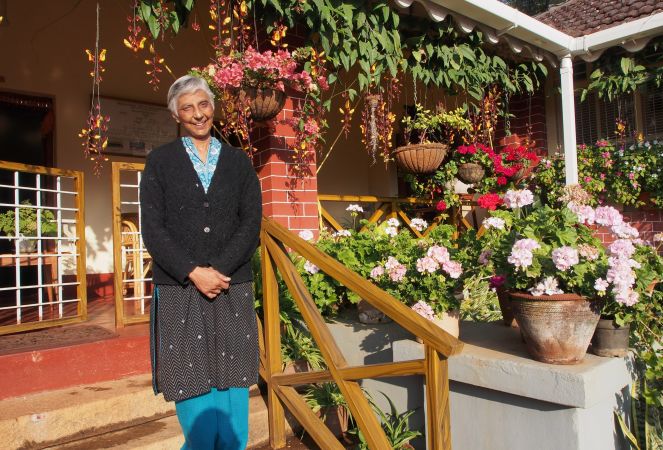 Coffee beans: Arabica (s795, hemavati, caturra)
Coffee beans: Arabica (s795, hemavati, caturra)Farmer Lekha Chandrasekhar runs her more than 100-year-old coffee estate on the lower slopes of BabaBudagiri mountain at an altitude of around 1000-1100m, next to Hirekolale Lake in the Karnataka province.
She has about half a century of experience in coffee cultivation. She has managed her farm alone for more than 20 years. In addition to coffee farming, Lekha is also running a cozy café in Chikkamagaluru, where we met her.
In India, Lekha is a unique farmer as few farmers have also run a café, which of course serves roasted coffee from her own farm. Further processing and serving her own product invariably leads to a more quality-conscious approach to coffee farming. Continued…
-
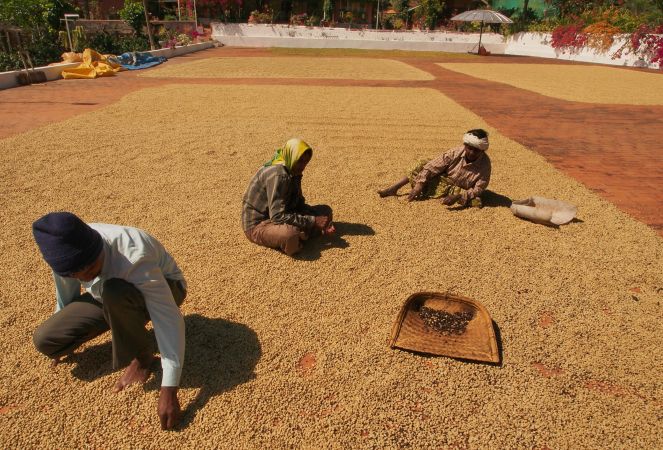 Coffe beans: Arabica (s795, hemavati, caturra)
Coffe beans: Arabica (s795, hemavati, caturra)Some of the people working on the farm are second generation farm workers, born on the farm. In particular, I have to mention the second generation employee who not only takes care of the cleanliness but also the cooking, as his very traditional South Indian dish on one of our visits was absolutely excellent and made a big impression on the visitor 🙂 The café’s service was also good in its day, But nowadays Lekha has given up the café business and concentrates on running her coffee farm, as she is now 75 years old it is a bit difficult to find time for friends, children, travelling and her hobby of gardenings.
Seasonal workers are also offered free health care, water, 24-hour electricity, and a school in town for their children.
-
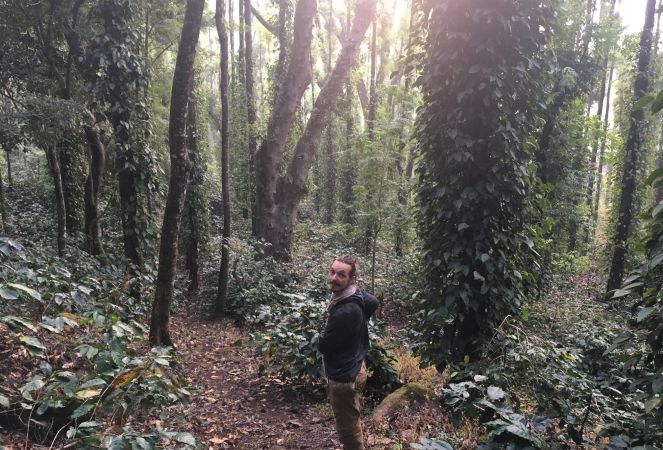 Coffee beans: Arabica (s795, hemavati, caturra)
Coffee beans: Arabica (s795, hemavati, caturra)Hirekolale coffee is wash natural processed, which is well suited to her Arabica variety as a processing method. The coffee has a slightly richer aroma than a fully washed coffee and also brings out the perky acidity that a quality coffee should have, but is sometimes missing in Indian grown coffees. The coffee is collected in two picking rounds, in the drying field the coffee is still hand sifted, which I haven’t seen done on other farms anymore, it reduces the amount of “de-effect” or defective beans. During the drying process, the coffee is constantly turned manually by walking around the field and using hand rakes to ensure even drying and avoid over-fermentation.
While walking in the coffee field, one can admire the huge old shade trees that protect the Arabica coffee plants. They also provide shade for the livestock, which in turn take care of fertilizing the farm. The beans imported by us are grown for us in a separate slot which is carefully managed and no non-organic fertilizer and pesticide methods are used in that area.Thank you Lehka!
Mid roast and city ++
Filter and presso.
PHABHAKHAN ESTATE
-
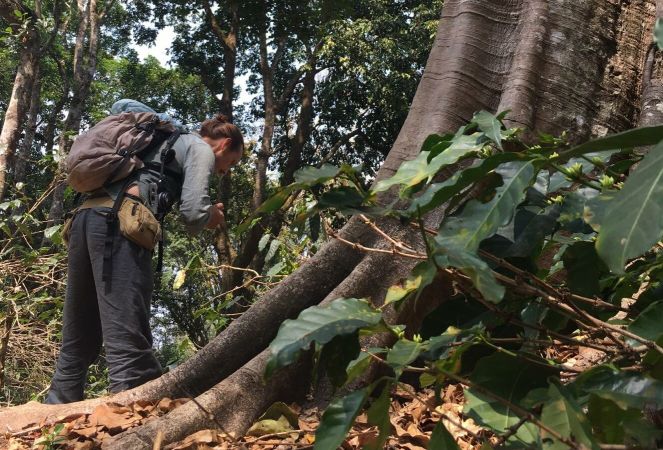 Coffee beans: Arabica (S795, Kent, Yellow Bourbon)
Coffee beans: Arabica (S795, Kent, Yellow Bourbon)
The farmer of Prabhakhan Estate, Christopher Mathais cultivates his coffee high on the Western Ghats. Christopher and his partners cultivate the rare Arabica Kent coffee subvariety 1934.
The estate processes its Arabica coffee with natural processing. High-quality and successful natural coffee starts with coffee collectors, who collect only ripe coffee berries by hand. This is slow manual work and usually requires about three rounds of coffee picking. Because of this, the collection costs increase, but the end result is a cup of coffee that has a wonderful aroma and is also more ecological than washed coffees.
-
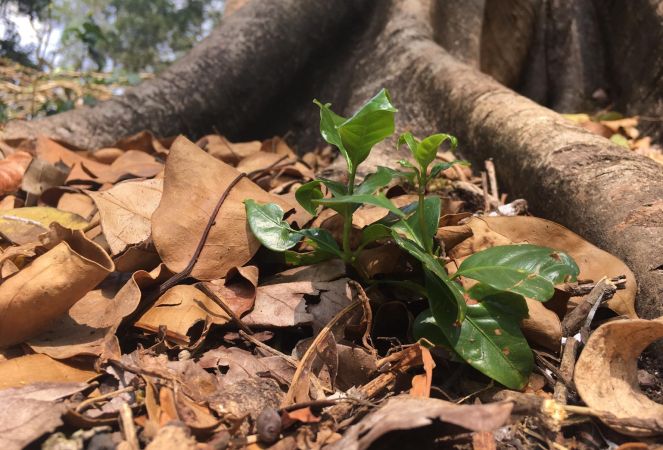 Coffee beans: Arabica (S795, Kent, Yellow Bourbon)
Coffee beans: Arabica (S795, Kent, Yellow Bourbon)
After picking the coffee berries are placed in the sun to dry, first on “raised beds” for 2-4 days, after which drying continues on the ground in the sun for 4-8 days. During the drying period, the fermentation of the coffee tree seed, i.e. the bean, takes place, which in naturally processed coffee is done by the berry’s own fluids, sugars and enzymes, unlike in washed coffee, where the fermentation is carried out in water tanks, which also consumes significant amounts of water. When producing Natural coffee, no water resources or pulpers that run on fossil fuels are used. This makes natural processing a significantly more ecological production method. Natural coffee has a naturally berry aroma and quite strong citrus-like acidity.
-
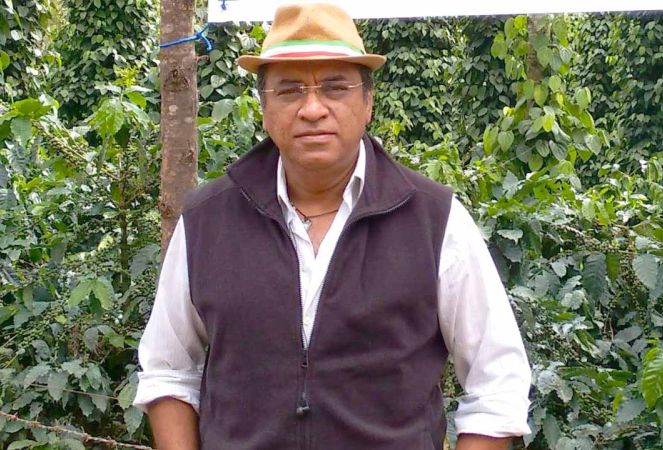 Coffee beans: Arabica (S795, Kent, Yellow Bourbon)
Coffee beans: Arabica (S795, Kent, Yellow Bourbon)
We at the Forest roastery have roasted Prabhakhan estate beans in three different roast levels. Light roast we take out before first crack. By this method you will have a very rich aroma with balanced acidity as a filter coffee. Mid roast we use as an add on to darker roast to create nice espresso that works beautifully with milky cappuccinos and lattes. Then the dark roast has a nice soft strong body of aroma with still some mild acidity in it. Dark roast Prabhakhan coffee our customers love a lot as a filter, mocca and espresso brews. This is a great bean and works great with many different roasting levels. It´s more about the roaster what he or she wants to get out of it.
Natural
Light and dark roast.
BALMAADI ESTATE
-
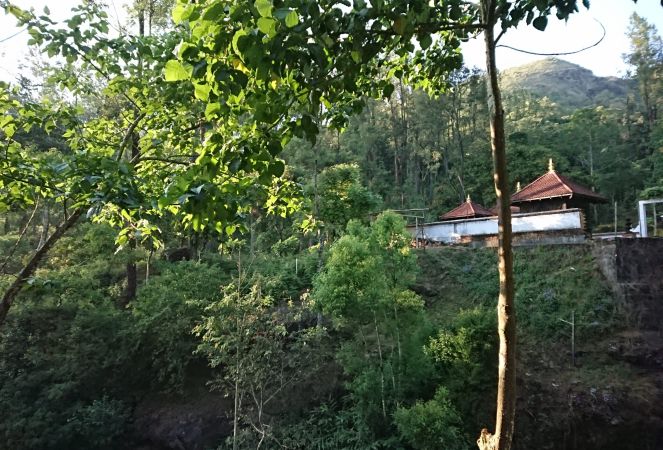 Coffee beans:
Coffee beans:
Arabica (s795, caturra, kent)

These coffee beans come from Tamil Nadu in southern India, near the Silent Valley National Park. Farmer Unna Thiagarajan has been running her Biodynamic organic farm for 20 years, together with her skilled staff, some of whom have been dedicated to the farm for generations. The farm is remote from the city at an altitude of about 1500 m in the rugged mountains. The coffee is hand-picked in three rounds and processed using natural and honey methods. The Arabica varieties (s795, caturra, kent) are grown on the farm.
-
 Coffee beans:
Coffee beans:
Arabica (s795, caturra, kent)

On the Balmaadi Estate ancient Vedic farming methods and Biodynamic (Demeter) methods are combined. Demeter farming is man’s service to nature and its biodiversity. It is about supporting nature by nature’s own means. It is therefore not just a method for increasing production or growing healthy food. Demeter farming is organic, but even more widely, it is fully organic and self-sufficient. Fertilisers and pesticides are made from the farms own resources, including fermentation methods. Demeter farming is therefore about more than just producing healthy food.
-
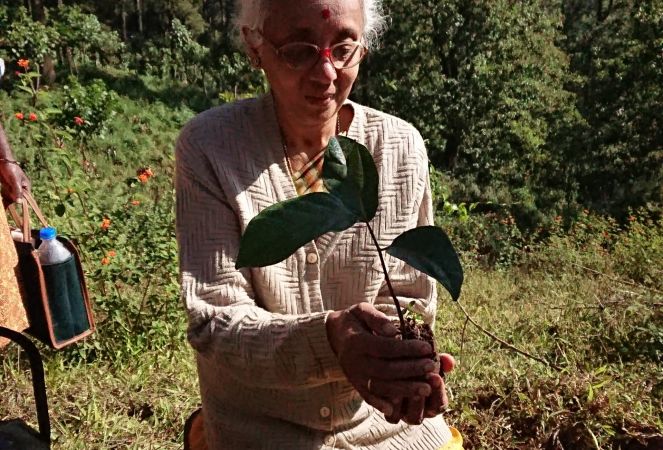 Coffee beans:
Coffee beans:
Arabica (s795, caturra, kent)

The farming approach is not based on efficiency in terms of yield or labour use, but focuses on producing high quality food while supporting nature. When we visited the farm, the idea of fairness and wisdom often came to mind. Even a natural feeling that: “This is a wise and truly sustainable activity for all concerned”. In addition to the biodiversity on the farm, you could sense a harmonious and communal atmosphere. This was a pleasure to witness on the ground, and now to be part of the community as an EU importer and roaster of this Estates coffee.
Natural & pulped sun dried (Honey)
Light and medium roast.
Filter, mocha, cold brew, milky coffee espresso.
BYNEMARA ESTATE
-
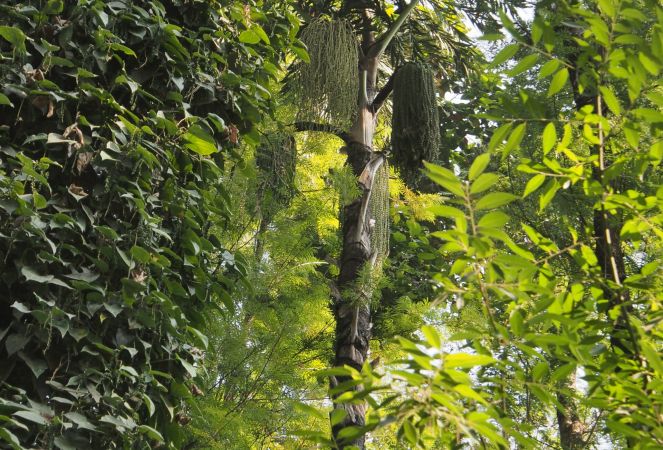 Coffee beans: Arabica (Catimore, S795)
Coffee beans: Arabica (Catimore, S795)The Bynemara Estate is in its fourth generation of coffee cultivation in the Benaragodu Mountains of western Ghate, Karnataka Province, at an altitude of 1000 – 1300 m.
Bynemara coffee is based on the desire to evolve and create better coffee. A generational change from father to daughter is underway, continuing a century-long tradition as a coffee-growing family. The farm’s special features are its diverse natural environment and the steep slopes where the coffee grows.
According to the farmers, it is the rich soil that gives their coffee its rich flavour, thanks to the surrounding vegetation and the exceptional microclimate.
-
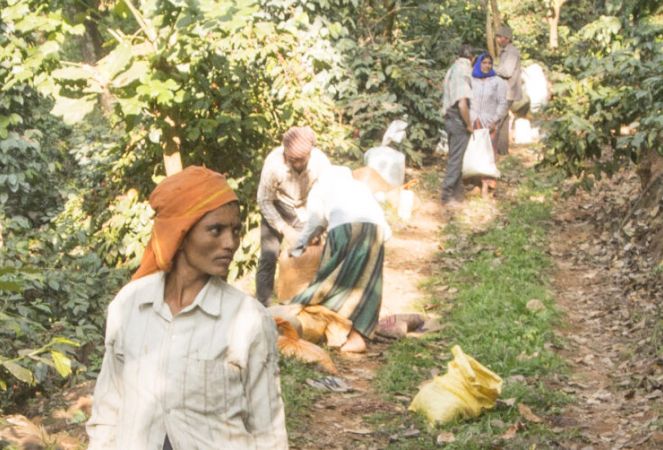 Coffee beans: Arabica (Catimore, S795)
Coffee beans: Arabica (Catimore, S795)There coffee beans are picked during three rounds to ensure the Arabica coffee berries are ripe at the time of picking. The ripe berry contains the seed of the coffee tree, also known as the bean. Picked at the right time, the bean is rich in aroma and roasts evenly. Before drying, the coffee is washed using the “full wash” method and left to ferment for 9-16h.
The younger generation of farmers on the farm describe the taste of their coffee as chocolatey, robust and slightly fatty. We recommend the Bynemara Arabica variety for a dark roast, at about 4/5 roast.
In 2023 we will also be receiving natural or PSD Pulped Sun Dried (honey) processed beans from the Bynemara farm, which we look forward to receiving and we will clarify the roast level recommendations for these beans at a later date.
Wash + natural
Dark roast
Espresso, Mocha
Coffee variety Robusta
We have two Robusta varieties available.
The Kerala tribal people’s organic natural Robusta and Dewadanam’s Pulped Sun Dried (Honey) Robusta from Karnataka.
The Robusta variety is a good addition to Espresso blends and in our own roastery we have also used it successfully as an addition to a pan coffee or Mocha coffee.
The Robusta variety has twice the caffeine, which gives a good kick, especially to milky coffee drinks, and creates a creamy espresso. It is also my own experience as a barista that dark roast Robusta espresso shot makes Latte art easier, due to the strong contrast.
Also, as a dark roast it works well with a dark roast Arabica variety. Often, especially good quality Arabica should not be roasted very dark, as you lose all the valuable aroma that a good quality coffee has. In this case Robusta is a good addition to bring that very dark, even Viennese roast aroma to coffee blends.
High quality Robusta has a good aroma, and when treated with natural or psd (honey) it is also an ecological coffee bean.
Moreover, Robusta does not require fertilisers or pesticides like Arabica, making it part of the coffee of the future, and an ecologically sustainable choice!